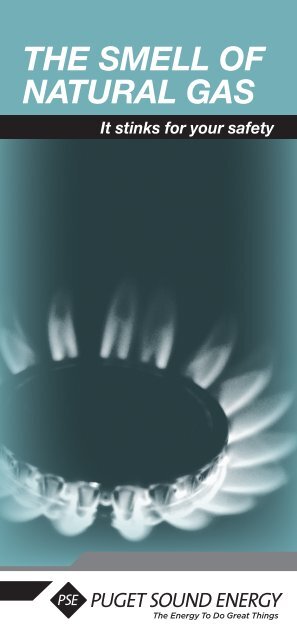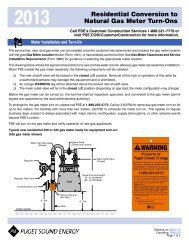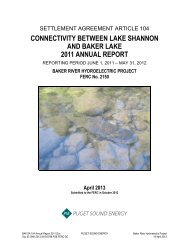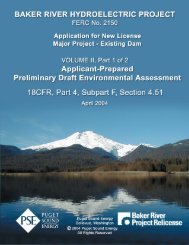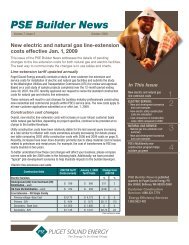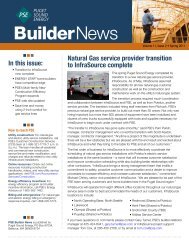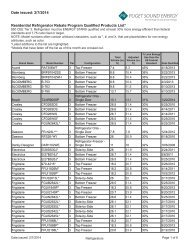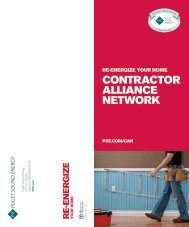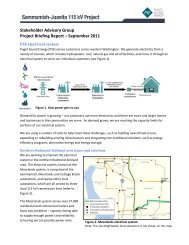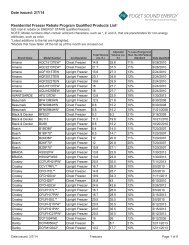THE SMELL OF NATURAL GAS - Puget Sound Energy
THE SMELL OF NATURAL GAS - Puget Sound Energy
THE SMELL OF NATURAL GAS - Puget Sound Energy
You also want an ePaper? Increase the reach of your titles
YUMPU automatically turns print PDFs into web optimized ePapers that Google loves.
<strong>THE</strong> <strong>SMELL</strong> <strong>OF</strong><br />
<strong>NATURAL</strong> <strong>GAS</strong><br />
It stinks for your safety
Clean burning natural gas is odorless, colorless and<br />
non-toxic in its natural state. <strong>Puget</strong> <strong>Sound</strong> <strong>Energy</strong> adds a<br />
distinctive odor called mercaptan to natural gas so even<br />
the smallest leak can be detected.<br />
Scratch the flame on the next page to learn how natural<br />
gas smells like sulfur or rotten eggs.<br />
If you smell natural gas<br />
◆◆Do not use phones (cell or land line phones), turn any<br />
electric switches on/off or use other electrically operated<br />
devices that could cause a spark.<br />
◆◆Do not smoke. Do not light a match or use a lighter or do<br />
anything that might create a spark.<br />
◆◆Leave the area immediately.<br />
◆◆Use a telephone outside the area and call PSE, 24 hours<br />
a day, at 1-888-225-5773 or 911.<br />
Using your nose is not the only way to detect a natural gas<br />
leak. Blowing dirt, bubbles rising in a puddle or a hissing<br />
sound may indicate a leak. If you notice any signs of a<br />
natural gas leak, call immediately.<br />
Natural gas safety features<br />
Natural gas is lighter than air. If it escapes into the air<br />
it dissipates quickly.<br />
Natural gas has a very narrow range of flammability<br />
and will ignite only in a concentration of 4 to 15<br />
percent gas in air.<br />
PSE.com
Scratch this flame with your fingernail. Then sniff<br />
the flame. Make sure your family and friends also<br />
know the smell of natural gas. If you ever suspect<br />
a natural gas leak, leave the area immediately. Call<br />
PSE at 1-888-225-5773 or 911.<br />
Raspe y huela la llama para reconocer el olor del<br />
gas natural. Si alguna vez sospecha que hay una<br />
fuga de gas natural, llame a <strong>Puget</strong> <strong>Sound</strong> <strong>Energy</strong> al<br />
1-888-225-5773 ó al 911.
A natural gas pipeline may be<br />
identified with a marker<br />
PSE, like other pipeline operators, installs<br />
above ground pipeline markers to indicate<br />
the approximate location of buried, high<br />
pressure natural gas pipelines, generally<br />
situated along highways and major road<br />
and railway intersections. These line<br />
markers display the name of the pipeline<br />
operator and the telephone number where<br />
the operator can be reached in case of<br />
an emergency. Pipeline markers and<br />
warning signs indicate only the presence<br />
of a pipeline. They should not be used to<br />
determine the exact location of the pipeline.<br />
Call 811 before you dig<br />
Whether you’re a homeowner or<br />
contractor, contact the 811 “Call Before<br />
You Dig” hotline two business days<br />
before digging. The “Call Before You<br />
Dig” law* requires anyone digging into the ground to call<br />
and have underground utilities located to avoid potential<br />
hazards with striking or digging up utility lines.<br />
If you think you may have damaged a natural gas pipe or<br />
smell the odor of natural gas, follow these important steps:<br />
◆◆Quickly move a safe distance from the damaged line<br />
where you do not smell the escaping natural gas.<br />
◆◆Call 911 after you’re at a safe distance.<br />
◆◆Report the damage to PSE at 1-888-225-5773.<br />
Customer-owned buried natural gas piping<br />
PSE regularly inspects the underground natural gas<br />
pipelines in the street and to your meter to make sure they<br />
are operating properly and safely. If you own buried piping,<br />
such as piping to pools, hot tubs, natural gas barbecues<br />
or detached buildings, it is your responsibility to maintain<br />
the piping unless PSE installed and agreed to maintain it. If<br />
your piping is not maintained, it may leak or corrode. Have<br />
a licensed plumbing contractor do the inspection and any<br />
necessary repairs.<br />
* See RCW 19.122 on http://www.leg.wa.gov.<br />
© 2010 <strong>Puget</strong> <strong>Sound</strong> <strong>Energy</strong><br />
1611 04/10 Printed with soy ink on recycled paper.


